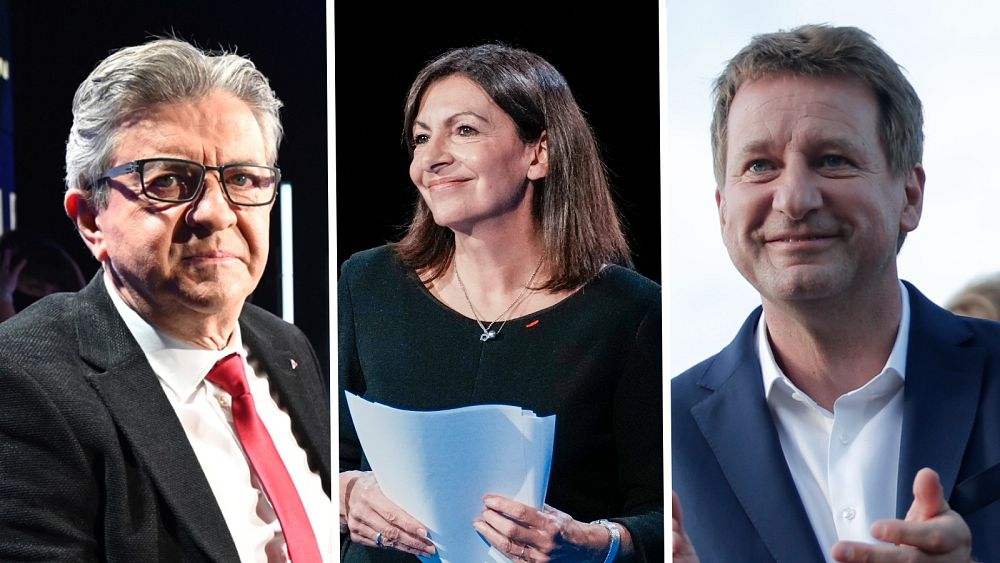
More than 180,000 people have signed a petition calling for left-wing parties in France to join forces in the country’s upcoming 2022 presidential elections to defeat a swathe of right-leaning figures.
Activists have organised a “Popular Primary” that would put forward a single “social and ecological” candidate to compete in the April election.
“The message of this popular primary is to say we have ecological emergencies and social emergencies that we cannot deny. We must act and in order to act, we have to win the next elections. And to win it, it’s simple, we have to be together and not be divided,” Cléo Belaïche, a spokesperson for the association behind the primary effort, told Euronews.
They’ve narrowed down this “citizen-driven” presidential primary to ten candidates who have until 30 November to decide if they’ll take part in the January vote.
There are three main candidates on the left that have currently already declared that they will run for president: Yannick Jadot, who won the Green party primary; Anne Hidalgo from the Socialist Party; and Jean-Luc Mélenchon, from his far-left party France Unbowed.
They are also named as part of the 10 candidates — five women and five men — in the popular primary.
While Jadot, Hidalgo, and Mélenchon have not expressed interest in running in the popular primary, so far, three other chosen candidates have agreed to participate.
But all three of them are currently polling below 8 per cent, according to an October IFOP opinion poll, far behind incumbent Emmanuel Macron, far-right figures Marine Le Pen and Eric Zemmour, and right-leaning Xavier Bertrand, who will vie for the Republicans’ nomination in December.
“What is clear is that if there is no one single left-wing candidate, there is very, very little chance that any of these left-wing candidates can win the election. So in a sense, they need to unite if they want to win,” said Simon Persico, a researcher at SciencesPo Grenoble who specialises in environmentalist parties.
But Persico says it’s unlikely to happen because each of the candidates wants to continue existing in the French system.
“The presidential election is really important for existing in the political landscape,” Persico says, adding that supporting another candidate could have repercussions on their parties.
The Popular Primary activists aren’t giving up.
They’ve been holding sit-ins outside each of the three-party headquarters in order to put pressure on the ecologists, socialists, and far-left France Unbowed to get behind the primary.
They say the stakes are high amid a climate emergency and increasing social inequalities.
A recent study showed the impact of measures taken during Macron’s presidency: it claimed the richest 1% saw the greatest purchasing power increase and only the poorest 5% of households did not see their standard of living increase during his administration.
“We need a primary because citizens need to reconnect with politics to decide who will be able to represent ideas in order to respond to ecological and social emergencies in 2022,” Belaïche said.
She also lamented the rising abstention rate during France’s elections.
Catherine Corsini, a director who recently released a film that takes place in a hospital during a Gilets Jaunes protest, said in an interview that it was incredible there wasn’t more of a will on the left-wing to unite.
“Every time a new candidacy is announced, it exasperated me. I wanted to hit them,” she told Mediapart in a video interview.
The initiative has attracted attention due in part to the number of signatures of support it’s received — already larger than the Green party primary and number of Socialist party members.
It’s even larger than the number of party members that will vote in the right-wing Republican party at the beginning of December.
It’s also received support from some of the well-known political figures picked by supporters to run in the popular primary.
“Gathering together is a very difficult challenge, but it is demanded by young people who are more engaged and impatient than ever,” tweeted former justice minister Christiane Taubira, one of the ten candidates.
Taubira, who has said she would not run for president in 2022 as to not add to the number of candidates, supports the primary and told organisers that they were right that 2022 needed to bring change.
The “Popular Primary” is set to take place between the 13 and 16th of January and would use a majority voting system where voters rank their approval of as many candidates as they like.
“We have much more in common between ourselves than we have in common with Mr Zemmour, with Macron or with Le Pen,” says Belaïche.